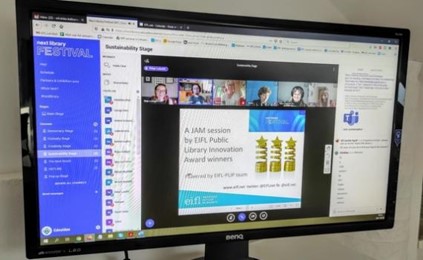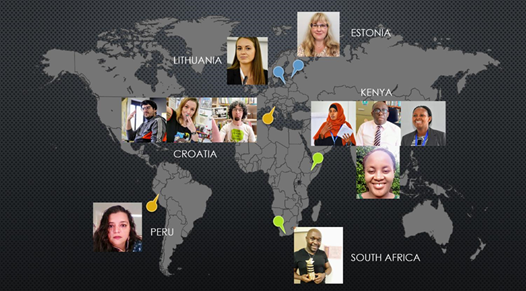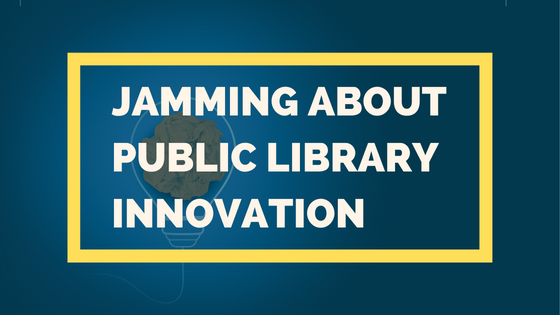In this week’s Princh Library Blog, we share an article by Ramune Petuchovaite, Public Library Innovation Programme Manager at EIFL. The article reflects on the JAM (Just-A-Minute) session the 10 previous winners of the EIFL Public Library Innovation Awards had during the Next Library Festival in 2021.
This article was originally posted on EIFL’s blog. To see the original article, click here.
Are you curious what Princh can offer for your library and your patrons? Then check out the Ultimate Guide To Princh For Libraries, to learn about all the benefits our solution offers! You can download our guide here.
The first online Next Library 2021 Festival on 3 – 4 June offered a remarkable space for learning about public library transformation centred on the community. The main themes were: Democracy, Creativity and Playful Learning in Libraries, and the Sustainable Development Goals. During a session organized by the EIFL Public Innovation Programme (EIFL-PLIP), librarians from 10 libraries that have won EIFL Public Library Innovation Awards shared their experiences of offering innovative services and spoke about the impact of the award on their professional lives and libraries.
Don’t be afraid to make mistakes, be open to new ideas, work with multi-skilled teams, consult with communities – these are the key ingredients for innovation, according to a group of librarians from 10 public libraries that have won EIFL Public Library Innovation Awards since the awards were launched in 2012. And the innovative librarians have been putting their courage and skills to good use – expanding their winning services, starting new ones, rising to the challenges of COVID-19, and thinking about life after the pandemic.
Innovations snowball since the EIFL Award
“Librarians in our library are fast-thinking, not afraid to make mistakes and not afraid to ask for help and cooperation from others,” said Triinu Seppam-Saar, of Tallinn Central Library in Estonia.
“One of our library’s newest services is to lend seeds, and soon we will be lending tools for gardening,” she added.
“We invested the EIFL award money (US$1,500) in developing a library smartphone app mKnjižnica (mLibrary), which libraries can customize to offer their patrons access to their libraries’ digital services, through their phones. We are getting requests about the app from other libraries and now there are more than 20 libraries in Croatia using mKnjižnica,” said Petar Lukačić, from Public Library ‘Fran Galović’ Koprivnica in Croatia.
“Since winning, we have come up with more diverse programmes for children and youth, for example, online book clubs. And we have a programme of pop-up libraries taking books to fields where children are playing soccer,” said Kaltuma Bonaya Sama, from Kenya National Library Service (KNLS) / Buruburu Public Library.

“We have been teaching children to write their own stories, and we have published 15 in the African story book website. We have also published a book called Meru Library Creative Kids Short Stories, with the best stories from five primary schools,” said Richard Wanjohi from KNLS / Meru Public Library.
Prelog City Public Library in northern Croatia has responded to the call by the Global Digital Library for partners in the ‘Translate a Story 2021′ campaign and is translating digital children’s books into Croatian. “We are going to implement them in a library app, which a third of all the libraries in Croatia use, thus allowing free lending of children’s e-books,” said librarian Maja Lesinger.
Librarian Jeff Nyoka expanded Johannesburg City Libraries’ Facebook video series, introduced during COVID-19 lockdowns in South Africa, to include an Oral Storytelling Relay Competition, in which teams of schoolchildren create video stories in relay format, challenging their creative, collaboration and technical skills.
“Since the award, the library established digital publishing and makers’ activities as a regular part of our work and services. The public image of the library improved very much – now it is perceived more as an institution focused on new and progressive ideas and services. The library has become an important part of the Rijeka 2020 – European Capital of Culture programme. The EIFL award was in many ways the beginning and a huge boost for new developments,” said Krisitan Benic from Rijeka City Library in Croatia.
“The award ignited staff motivation and enthusiasm for innovation. We researched underserved needs and built new partnerships to start a youth empowerment programme that provides young people with basic computer training and entrepreneurship skills, for free. Other age groups and professionals are on the library’s radar now,” said Miriam Mureithi from KNLS / Thika Public Library.
The National Library of Peru, which manages a network of public libraries across the country, is expanding their telephone reading service ‘Aló BNP’,which provides company for senior citizens isolated as a result of COVID-19 lockdowns: “We introduced gifting campaigns for special days like Valentine’s Day and Mother’s Day, and some of the seniors who were gifted library reading sessions by family and friends are signing up to use ‘Aló BNP’ regularly. We are also planning to offer the service in Quechua, one of Peru’s many indigenous languages,” said librarian Marcela Poirier Maruenda.
Covid-19 – Challenges and lessons
COVID-19 has shone a light on the need to innovate, and is accelerating the shift to digital: “Without new e-library services, strong digital channels like GKR Magazin, a community-created magazine for adults, and Brickzine, a magazine about culture for kids and parents, and using digital technology for sterilizing books, it wouldn’t be possible to keep the community engaged and interested in the library world. Innovative services proved to be an essential part of library resilience to the challenge of COVID-19,” said Kristian.
For Miriam, lack of access to ICT in the community was a problem. “We were not able to offer virtual or online services since the majority of library users cannot afford the internet and they rely on the library to access computers and the internet!”
“We learnt that it is very important to keep details of library users who can engage digitally if face-to-face interaction becomes impossible,” said Kaltuma.
And there will be challenges after the pandemic: “We initiated lots of new e-services during the pandemic, but now people are asking us to continue with these e-services, so we have a new challenge – how to offer all these e-services and offer physical services at the same time with the same amount of librarians,” said Triinu.

Mistakes to avoid
Innovation is a trial and error process, and there have been mistakes: “We have been training youths on digital skills – but we never showed them how to utilize the skills to make their lives better. Now, after the digital skills training, we introduce youth to the online learning site ‘Tutor web’, where they can connect with and tutor students, who need help, for example, with math. We help them to discover opportunities in digital life,” said Joan Njogu from KNLS / Meru Public Library.
“Before the pandemic we organized digital skills programmes just for users. I realized it was a mistake to underestimate the value of advancing the digital skills of library staff beyond the eLearning Department. So many different skills are needed so that librarians are prepared to embrace changes,” said Jeff.
“Having too many projects at the same time,” said Kristian.
And of course innovative librarians have ways of overcoming mistakes: “Sometimes you just have to let it go, relax and breathe, forgive yourself and learn from it, and move forward,” suggested Triinu.
Is it worth innovating?
So, is introducing and implementing innovations in public libraries worth it? Definitely.
“It inspires librarians to be passionate about librarianship and to see more possibilities,” said Jeff.
Maja agreed: “You have to innovate. You can’t be stuck in one place all the time. Libraries survive because of the innovation in their services. It is a very painful and hard process, but in the end it is worth it!”
“Our library’s innovations are making a difference in people’s lives. For that reason, we welcome new opportunities and are open to creative ideas,” said Monika Straupytė from Kaunas city library in Lithuania.
Festival with a spirit of experimentation
The Next Library Festival 2021 attracted over 1,150 participants from more than 40 countries across all continents, connecting the biggest and most diverse crowd ever of forward-looking and curious public librarians, library leaders and transformers. It offered a mix of keynotes by celebrated library practitioners and researchers, interactive discussions, creative workshops, ignite talks, and surprises. A big thank you to the adventurous team of Aarhus Public Libraries, Denmark – old friends and partners of EIFL – for deciding to experiment with a 24-hour virtual festival, and for offering free tickets to public library professionals from across the globe, regardless of time zone.
“We must turn our efforts and our learning, and our success to reinviting our network. Are our people linked? What about those who work in libraries that are far from embracing their communities. What about the librarians and innovators that find themselves as lonesome voices in an increasingly uncomfortable status quo? What about those librarians – librarians by education, by title, or by spirit, that need mentors and support? It is time to build a global network of new librarianship,” said Professor David Lankes, director of the University of South Carolina’s School of Information Science, in his keynote address.
Let’s make the Next Library Festival 2021 the start of that network.
Ramune Petuchovaite
This article was written by Ramune Petuchovaite, Public Library Innovation Programme Manager at EIFL.
The article was originally posted on EIFL’s blog. See the original article here: https://www.eifl.net/blogs/jamming-about-public-library-innovation.
Recent posts
Green Libraries: How Sustainable Design is Shaping the Future of Public Libraries
In this week's Princh Library Blog post, recurring guest writer Sam L. Bowman discusses an ever so important topic: sustainable design and [...]
Librarians Supporting Digital Literacy in the Community
In this week's Princh Library Blog, Nina Grant covers why digital literacy is important, the variety of ways in which librarians are supporting [...]





Leave A Comment